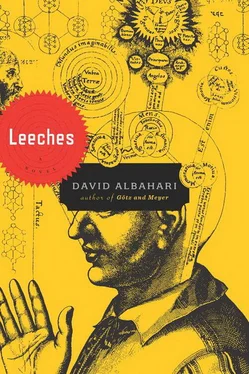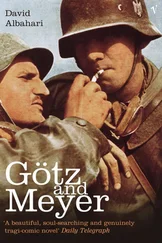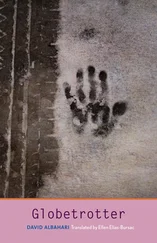burek. The
burek was greasy; I had to lick my fingers. I licked them one by one, ignoring the woman behind the counter. Then I bought a crescent roll with jam and asked for a glass of water. The water was lukewarm. I sipped at it and leafed through my notebook. I still had to go through Pobeda Square, and I mustn't forget Piljarska Street, the narrowest of the streets around the market but full of handy places to leave signs. This proved true: I found as many as six on Piljarska, drawn at precise seventy-centimeter intervals. By now it was late afternoon, fewer people at the market, time to head home. Clouds were gathering in the sky, rain was on the way. I stopped at the stationery store on Zmaj Jovina and asked for a map of Zemun. They had only a commercial map of the city, with the stores and businesses drawn in, but it was large and comprehensive, and I was happy with it, especially because in the upper-right-hand corner it had a magnified insert of the city center. My feet were stinging by the time I got home. I spread open the map on the kitchen table and began marking the places where I had seen the signs. The part around the market, I noticed, consisted of nine different-sized blocks, of which one, the one that came out to the quay, bordered by Zmaj Jovina and Karamatina, was in the shape of a triangle. The number nine may have had special significance, but I didn't dare call Dragan Mišović again. I could have asked Jaša Alkalaj, of course; after all, numbers are numbers, whether it is mathematics or the Kabbalah. I leafed through the notebook and marked the dots in different colors. Most were red, a few were blue, three or four green, and three were black. Once I had put in the last dot, I stepped back to see the map from a distance. I didn't know what I would see, I didn't know what I expected to see, I didn't actually see anything. The dots, dense in some spots and sparse in others, surrounded all nine blocks; only the middle, which was roughly at the place where Gospodska Street ran into Omladinski Square, was empty. I was disappointed, I admit. I had expected that this pattern would immediately suggest things to me I hadn't known, but it told me nothing, though perhaps it was speaking an unfamiliar language. Once more I checked everything carefully, and then I rolled a joint, lit it, and walked over to the window. I looked to the left, I looked to the right, then straight ahead. The window of the pharmacy was already lit; not a single car was parked in front of it; I could take a deep breath, inhale in peace. Slowly, deeply, I inhaled, watching night conquer the sky and felt the cannabis rise in my body: my knees softened, my stomach sagged, my heart beat faster, my eyelids drooped, and when I felt it behind my forehead, I went to lie down. That night I dreamed a strange dream. I regret not writing it down right away; with time it faded, and now, no matter how hard I try, I can summon only details and cannot, for the life of me, reconstruct the whole thing. Nothing particular happened in it, as far as I recall, and one could say I was dreaming emotions more than events. I remember, for instance, that I dreamed I was sleeping and that I was waking up but couldn't open my eyes. I wake up, in the dream, because someone is sitting by my bed, leaning over me, and staring at my closed eyes. Since I am dreaming that my eyelids are shut, everything I see in the dream is dark. I am awake in the dream but I don't dare open my eyes, I'm fearful of what I'll see, and I remember saying to myself in my dream, Maybe these are ordinary human eyes. Then a voice, right by my ear, says: There is no such thing as ordinary human eyes. And then: Each eye is a story unto itself. Then I was really awake, unsure of who had heard that voice or who was feeling fearful. I dreamed the same dream several times that night, and in the morning I could barely stand up. Go back to bed, I said to my reflection in the mirror. The reflaction didn't answer, and even if it had, it wouldn't have helped, because that morning I had to edit the piece for my
Minut column. Recently everybody had been talking about a referendum in which the people, the government claimed, would decide whether or not the involvement of foreign powers in resolving the Kosovo crisis was acceptable, and the editor, remarking that political subjects didn't seem to interest me much, said that he would still find it interesting to read what I had to say. I finally chose a different topic: the problems caused by the vast number of stray dogs, including quite a few purebreds whose owners, unable to cover the cost of food and care, had simply cast out into the street. Of course, I didn't feel that deciding the fate of Kosovo was any less important than abandoned dogs, but anyone could see that the way the referendum was being run was a farce and that there was no point in wasting words on it. The consequences would not be part of the farce, but someone else would write that story, not me. The stray dogs were left to me and the dilemmas they posed for us — the question of goodness and a test of loyalty. I wrote without passion, using cliched phrasing and attacking the class of the newly rich for squandering their wealth on rare and expensive breeds of dogs, then shunting their problems off onto society. The simplest solution, I wrote, is to put the dogs down, but this does not go to the root of the problem, it deals only with the consequences. The real question is what to do with the people who abandon their dogs, and I was leaving it to the readers, I wrote, to come up with the most fitting punishment. Such a shame that it didn't occur to me at the time to encourage readers to send in their suggestions, because this might well have resulted in a little encyclopedia of both well-meaning and vengeful cruelties, intriguing proposals, though it may not be too late for this, if one bears in mind that, judging by the news that reaches me here, the problems with stray dogs in Serbia persist. There is no more
Minut, of course, it went the way of so many other daily and weekly papers unable to secure a large enough readership, so I would have to write for a different publication,
Evropa or
Vreme or whatever the periodicals published there these days are called. I couldn't believe that the editor of
Minut liked my piece, despite the fact that he was a cat lover, and besides his own, he fed three or four other cats in the yard of the building he lived in. Later it turned out they had to cut the piece down, that's why I was at the editorial office that morning with the editor in chief and the copyeditor. While we were waiting for the edited text to be entered into the computer, the editor in chief told me he had divorced his wife because she didn't like cats. She tried, he said, but couldn't. Whenever Feliks, the editor's old tom, jumped on the bed, she'd scream, he said, and she'd scream until Feliks left the room or until the editor carried him out. She put up with it for two years, which was, he said, admirable, then she gave him an ultimatum: it was Feliks or her, one of them would have to go. The editor thought about it, he said, for precisely three seconds, then got up, took down two suitcases, and began tossing her belongings into them. She sobbed, he packed, Feliks meowed, the phone rang, the TV news blasted, he had never in his life been in such a tangle of sounds, but once she left, everything was quiet and, I might not believe him, but Feliks hadn't meowed since. I didn't know what I'd done to deserve this confidence; our conversations had always been limited to work, to remarks about my columns and discussion of future pieces. Maybe, I told Marko when we ran into each other in front of the Youth Center, I should have reciprocated in kind and told him something from my own life? The man is lonely, that's all, said Marko, and besides, like anyone with a measure of power and control over others, he sometimes has the need to show himself in a benevolent, gentle, human guise. Refer to that same story tomorrow, Marko continued, and don't be surprised if he tells you to mind your own business. We waited for the light to change, crossed the street, and, on the other side of the square, headed for Knez Mihailova. I paused at the corner, looked to the left, looked to the right, then hurried after Marko. Good, I said when I caught up, they are not here. Who? asked Marko. Or do you think everybody knows? I reminded him of the men with the crewcuts. He dismissed this with a wave of the hand. They don't matter, he said, and within the year they'll be gone, trust me. I don't know where Marko is now, but I do know how wrong he was. The nationalists have not disappeared, nor are they insignificant; on the contrary, they are more present than ever, and their influence is again on the rise and shows no signs of waning. That is how things now stand, judging by the meager news reports and rare email messages that I trust because they come from reliable sources, while back then, in the constant, exhausting expectation of change, Marko's certainty was understandable and acceptable. Oh Lord, when I think of the waiting, of the energy invested in faith and hope, my stomach clenches. How slowly it was all built, with how much effort, and with what speed it was all dismantled, stopped, mired in swamp. There are some things one should not think about, or maybe one must never stop thinking about them, I still haven't decided which of the two to choose, but whichever I choose, nothing can be changed anymore, life is a line that moves forward only at one end, while the other stays in place, rooted, and no matter what we do, what we say, we can't get near it, just as I already said, I mean, wrote, even though that was not wrong, because I often first say sentences aloud, turn the words over on my tongue, listen to them bumping and bouncing back from the empty corners, but whatever the case, I am repeating myself, no doubt, which should not be seen as a bad thing, since all of life is segments repeated from other lives, with only the order of the segments new and singular, bringing an element of surprise to life, and
Читать дальше







![David Jagusson - Fesselspiele mit Meister David [Hardcore BDSM]](/books/486693/david-jagusson-fesselspiele-mit-meister-david-har-thumb.webp)




